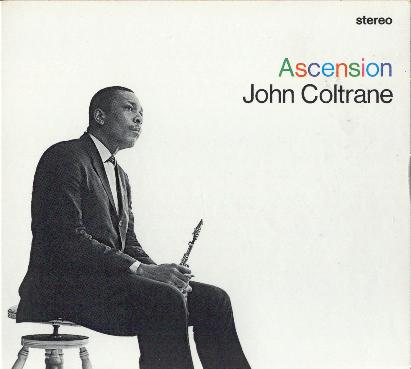- Ascension (album)
:"This article is about the John Coltrane album. For other uses of the term, see
Ascension ."Infobox Album |
Name = Ascension
Type =Album
Artist =John Coltrane

Released = 1965
Recorded =June 28 ,1965
Genre =Jazz
Length = 79:26
Label = Impulse!
Producer =Bob Thiele
Reviews =
*Allmusic Rating|5|5 [http://allmusic.com/cg/amg.dll?p=amg&sql=10:bt3ibkj9hak0 link]
Last album ="The John Coltrane Quartet Plays "
(1965)
This album = "Ascension"
(1965)
Next album ="New Thing at Newport "
(1965)Ascension is a
jazz album byJohn Coltrane , recorded and released in 1965. It is often considered to be a watershed album, with the albums released before it being more conventional in structure and the albums released after it being looser,free jazz inspired works. In addition, it signaled Coltrane's interest in moving away from the quartet format. Coltrane described "Ascension" in a radio interview as a "big band thing", although it resembles no big band recording made before it. The most obvious antecedent isOrnette Coleman 's octet ("double quartet") recording, "", which, like "Ascension", is a continuous forty-minute performance with ensemble passages and without breaks. But Coltrane's eleven-piece group is much more integrated, moored to a monolithic rhythm section (centered on drummerElvin Jones —second drummerRashied Ali abruptly dropped out of the session shortly before the recording was to take place) rather than Coleman's duelling, more or less independent quartets.On "Ascension" (and unlike on "Free Jazz"), group ensembles alternate with solos, and take up about equal space. Coltrane gave the musicians no directions for their solos, besides that they were to end with a crescendo. The ensemble passages are more structured. There were chords, but apparently they were optional; it is more accurate to say that the ensembles consist of a progression of modes rather than chords, with mode changes signalled by Coltrane, pianist
McCoy Tyner , and trumpeterFreddie Hubbard .By comparison to "Free Jazz", "Ascension" features a much expanded "front line", with two altos, three tenors, and two trumpeters. The horn section consisted mostly of younger players, most of whom would soon attain some degree of fame on the (free) jazz scene. A notable exception is trumpeter Dewey Johnson, who plays the first solo of the album after Coltrane. Plagued by mental illness, Johnson never made another professional recording, eventually disappearing in
New York City in the 1980s. Because of Johnson's obscurity, and his prominent place on the album, his solo is sometimes mistaken for Hubbard's.Two takes of the piece were recorded. The second take was issued first, then withdrawn at Coltrane's insistence; this came to be called "Ascension, Edition I" (although nowhere on the LP was it identified as such). It was eventually replaced with the first take, similar except with a different solo order and no drum solo by Jones. This is "Edition II", and an etching in the
outgroove of the vinyl LP identified it as such.Jazz musician
Dave Liebman , commenting on "Ascension", recalled that the album was the "torch that lit the free jazz thing".CitequoteBoth takes are available on the CD reissue.
Track listing
#Ascension – Edition II – 40:23
#Ascension – Edition I – 38:31Order of solos
Edition II
#(opening ensemble)
#Coltrane solo
#Johnson solo
#Sanders solo
#Hubbard solo
#Tchicai solo
#Shepp solo
#Brown solo
#Tyner solo
#Davis, Garrison duet
#(concluding ensemble)Edition I
#(opening ensemble)
#Coltrane solo
#Johnson solo
#Sanders solo
#Hubbard solo
#Shepp solo
#Tchicai solo
#Brown solo
#Tyner solo
#Davis, Garrison duet
#Jones solo
#(concluding ensemble)Personnel
*John Coltrane -
tenor saxophone
*Pharoah Sanders -tenor saxophone
*Archie Shepp -tenor saxophone
*Freddie Hubbard -trumpet
*Dewey Johnson -trumpet
*Marion Brown -alto saxophone
*John Tchicai -alto saxophone
*McCoy Tyner -piano
*Art Davis -upright bass
*Jimmy Garrison -upright bass
*Elvin Jones - drumsSource
* Kahn, Ashley. "A Love Supreme: The Creation of John Coltrane's Classic Album". ISBN 1-86207-602-2
Wikimedia Foundation. 2010.
